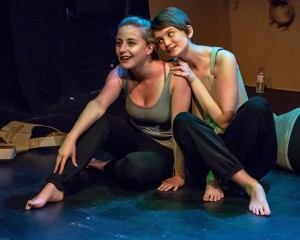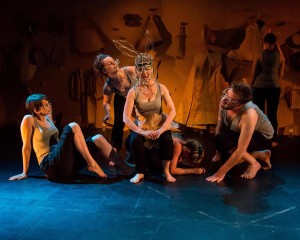
Some characters are re-gendered in Well-fangled Theatre’s A Midsummer Night’s Dream. (Photo by Michael J. Oakes)
A Midsummer Night’s Dream is well known for its magically romantic narrative of quarrelling lovers and tricksy fairies, so expectations were high for something unique. Well-fangled Theatre, led by director Mark France, more than delivered on this hope with a triumphantly fleet-footed adaptation.
The first thing that is immediately striking is the wonderfully inventive costume design by Simon Jarvis. Wrought from nothing but cardboard and sculpted slivers of metal, the effect is enchanting and goes a tremendous distance in transporting the audience to a world where humans and fairies meet. The set design ingeniously continues this. Rather than feature a more traditional backdrop, the costumes are hung against the back of the theatre in separate, named sections for each actor. This works brilliantly in keeping track of the characters, and is used ingeniously for stage exits and entrances as the actors move in and out of their respective stations, their backs turned to the audience like defiant action figures amongst their props.
This design is well met by considered lighting design by Sean Byrne and sprightly musical accompaniment from Alexander King.
The cast is a winning band who mix their roles with ease as the story jumps between lovers, fairies and a haphazard acting troupe with glee. The four lovers are played with immense charm by Claire Morley, Hattie Patten-Chatfield, Amy Fincham and Jamie Mckeller. This quartet is so natural and likeable in the roles, by the ending it’s difficult to imagine the characters being gendered in a more traditional manner.

The character, Bottom, in the fairy kingdom (Photo by Michael J. Oakes)
Morley is a standout, keenly flitting from the confident, fist-flinging Lysandra – that’s Lysander in Shakespeare’s original version – to the stage fright ridden Flute. Her competitor in affections, McKeller, brings an infectious doltishness to Demetrius and amusing directorial impatience to Quince, whilst Chatfield and Fincham do hearty work as they wrestle with their magically addled lovers.
Outside of the central quartet, Bill Laughey brings a warm, avuncular presence to his Thesius when he’s not presenting a gentle Titania. Meanwhile, Josie Campbell provides an imperious Oberon and Hippolyta.
Anna Rose James capably lands the tricky role of Puck – bouncing, coiling and wandering about the stage as nimbly as her character skips across the three narratives.
Patricia Jones has perhaps the most impact, however, with a brilliantly unhinged portrayal of Bottom.
There is such an infectious camaraderie amongst the cast that by the time the final act is reached and the hilarious show within a show is performed, the audience is in stitches. For any that feel Shakespeare is too serious a world to tread, try to make it through the Rude Mechanicals inept rendition of The Most Lamentable Comedy and Most Cruel Death of Pyramus and Thisbe without a single chortle.
The only criticism to be made is that there is some sporadic confusion for the uninitiated with regard the exact intended gender of some of the characters. Whilst some, such as the renamed Lysandra or Nicki Bottom are clearly flipped, some remain the same and are simply played by members of the opposite sex. This is a minor quibble, however, and overall gives the play an added frisson, particularly in Egeus’s disapproval of the relationship between Lysandra and Hermia.
Whether you’ve seen the play before or have come to it with fresh eyes, Well-fangled Theatre has produced an uproarious, inventively designed and beautifully performed delight.



